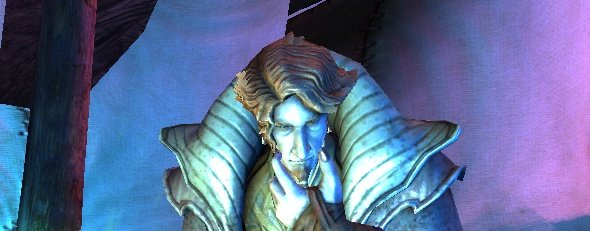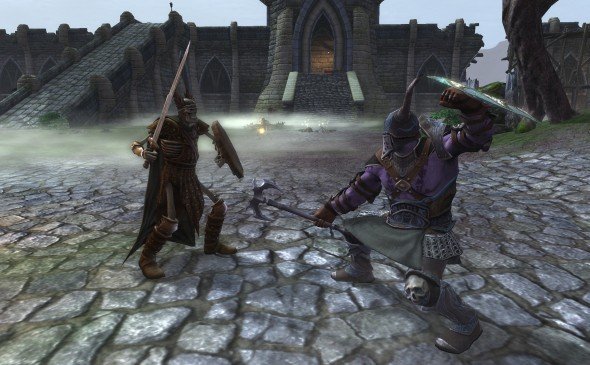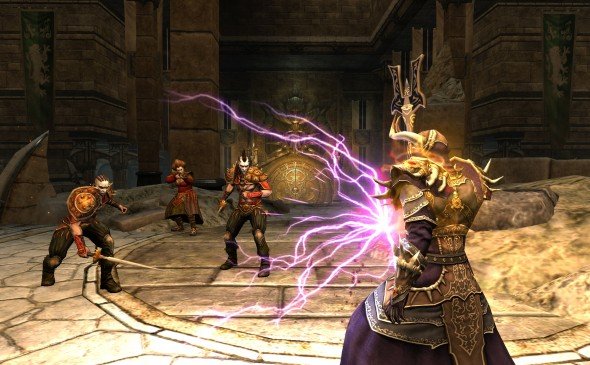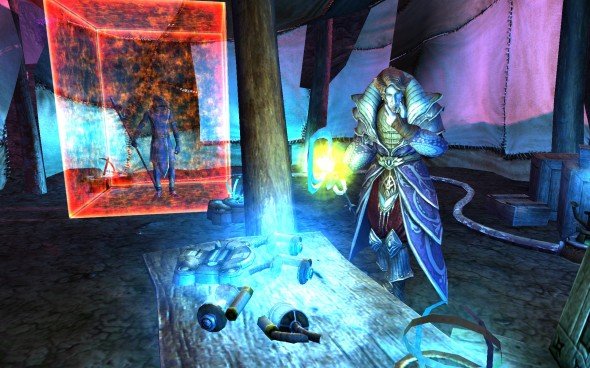Create three-class combos in Rift: Planes of Telara

You have died. That's the start, not the end of Rift. You are simply too awesome to stay dead. Instead, you start the game fighting your way through limbo back to the land of the living, at which point you'll emerge at an interdimensional crossroads, and into the game proper.
Rift is a fantasy MMORPG in a world that's being invaded by not one, but about half a dozen other planes of existence. Through, yes, rifts. Game-wise, that makes it an unpredictable landscape of sudden attacks pouring out from these portals, and unexpected opportunities to jump through them and explore a completely different universe.
“The entire idea of the engine that the game sits on,” says development director Scott Hartsman, “is that it lets us do some interesting things with dynamic content that you're not gonna see in other games.” So it's not just a few ambling critters wandering out of a hole in spacetime – there are rival factions who can take over whole settlements depending on your actions.

“Having the world reacting to what the players are doing, so that the balance of power can be pushed from faction to faction, is definitely one of the things we'll be doing with this system,” says Scott. “There's a system behind it that knows the state of all the players in the world, so we have ways of intelligently doing this without stepping on the poor level six guy who just wants to beat up the undead.”
Without seeing something like that in action, it's always hard to judge how much of it is a nice theory and how much will truly make the game world a more exciting place to be in. So the most interesting thing about Rift, to me, is the way that they're handling classes.
“Players are ascended souls,” Scott says, “and there are some souls that weren't quite strong enough to make it. So when you begin the game, you choose what your soul was in its life – a Pyromancer, a Nightblade – and that's the soul you begin with. That determines your abilities, your power system, the primary resource mechanic, and the gear you can use. Then later on, through questing or advancement with NPCs, you can discover other souls. You can collect and, not to sound vampirey but, embrace these other souls.”
You can ultimately embrace up to three different souls at the same time, and they can be different classes to your own. You then pick and choose how to invest your powers across them: spreading them evenly across three different classes, keeping your original as your primary, or even investing everything in one of the new souls you've picked up to completely change your character. “It lets players create their own combinations of classes and cool combinations of powers that even we didn't really foresee,” says Scott.
The biggest gaming news, reviews and hardware deals
Keep up to date with the most important stories and the best deals, as picked by the PC Gamer team.

“In all the MMOs I've worked on, people have always wanted more and more ways to do interesting things with their classes, and what we've done is taken class play and class experimentation and almost turned it into primary gameplay.”
A quick way to find out if someone really loves the game they're working on is to ask them how they play it. Scott immediately lights up at the question, then hesitates. “Hmm, am I playing announced classes, or classes that I can't talk about? Right now I've been playing a Nightblade/Ranger combination that's quite a bit of fun. So it's a guy who has the ability to attack from afar, has the ability to have a buddy out there in the field, and then also has some throwing weapon abilities and an excellent melee finisher.”
Between them, Scott and his team at Trion have worked on 27 different MMORPGs. Sharing and analysing that experience has informed their decisions about Rift on every level, right down to the nitty-gritty like group size. “We're doing five-man groups – and ten- and twenty-man raids,” says Scott. “The last few games I've worked on have been six person groups. The reason we ended up going with five-man groups is if you want to create challenging content, you end up having to solve what's called the two healer problem.”

“In a six-person group system,” he explains, “if you make content that's hard, people will bring two healers to it. Two healers, a tank or two, and a couple of damage-dealers. And what happens if you balance for that kind of group is that you just make it even harder for groups to get off the ground, since healers and tanks tend to be limiting factors.”
“So our goal is to not make it even harder for players to get into groups. It's one of those things that you don't really realise until you've been doing something the same way for seven years and you think: 'You know, there's probably a better way of doing this.'”
It's nice to think that the sheer number of fantasy MMORPGs out there might actually start making them better, rather than increasingly hard to tell apart.
- Publisher: Trion Worlds
- Developer: In-house
- Release: 2011
- Link: riftgame.com

